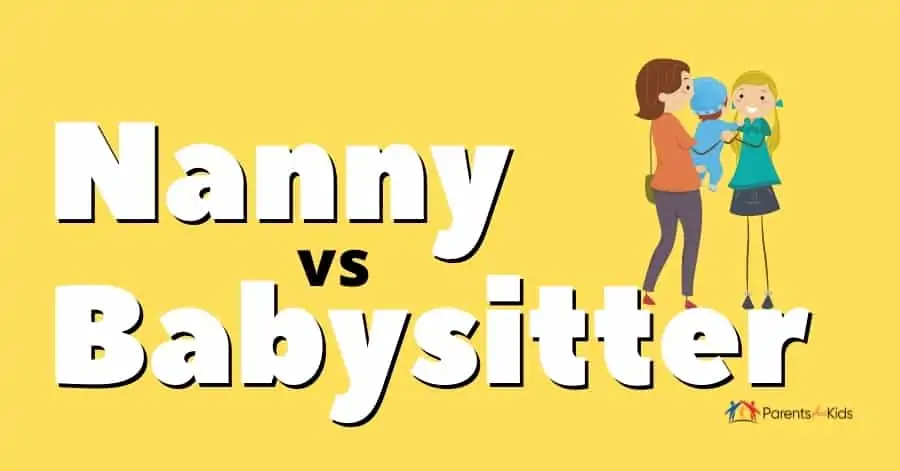Nanny vs Babysitter: Differences and Similarities

This post may contain affiliate links. If you buy through the link, I may earn a commission. Learn More.
Finding someone to care for your kids when you’re working or otherwise away can be difficult. Two of your childcare options are either a nanny or a babysitter.
Mistakenly, many people believe the two roles are the same. They are not.
There are actually several differences, and I’m going to dive into those differences to help you determine which of these options is best for your family.
*FYI, some of the links in this article about babysitter vs. nanny may be affiliate links. If you click and make a purchase, we may get a commission (at no extra cost to you). For more info, please see our disclaimer.
What’s the difference between a nanny and a babysitter?
A babysitter is a childcare provider hired to watch children, usually for a couple of hours on an irregular basis. A nanny is a caregiver hired to watch children on a full-time basis. Unlike the babysitter, the nanny is usually given other chores and is often considered another family member.
Let’s take a deeper look into how these two roles are similar and how they differ.
Education

Being a nanny is a career, not a side job. Many people who have chosen to be a nanny have invested in some child-related degree. This might be attending a program in early childhood education or something similar.
While not all nannies have four-year degrees, most of them at least have years of experience with kids. In either case, a nanny is equipped to be a co-parent to your child.
Babysitters usually have no degree in childcare. This does not mean that none do but more that it’s not expected. Who needs a degree to ensure your kid is safe while watching their favorite movie for the 700th time?
Some babysitters do get certified in CPR and first aid, though. If such a certificate makes you feel better about leaving your kids with a babysitter, you can find one.
Pro-Tip
Whether it’s a nanny or a babysitter, make sure caregivers watching your children are CPR certified.
You don’t typically have to worry about this with daycare providers since they usually have someone in the building who’s CPR certified, if not all of them.
On another side note, if you’re not CPR certified, you should be. You can go here to check out some of these CPR programs.
Work Schedule

The work schedules of a nanny and a babysitter are one of the major differences. Nannies are a more permanent fixture in the household.
Most work anywhere from 40 to 50 hours a week to cover the parents’ work schedules, though some may only work part-time. Nannies provide care when the parents cannot, so it really all depends on the parents’ needs.
Babysitters, however, are available on an as-needed basis. They often work a few hours here and there for specific times, like girls’ or guys’ night out. You could also hire a babysitter to cover your nanny’s sick day or vacation time.
Tasks

The duties of both a nanny and a babysitter depend on what the parents need, and everyone agrees to. However, there are some commonalities to expect from the two. Let’s take a look.
Nannies are an extension of parents, meaning they provide pretty much anything that a parent will. This can include the following and more:
- Giving baths or supervising bath times
- Preparing meals
- Arranging and taking kids to play dates, school, and other activities
- Providing tutoring, help with homework, and even early education
- Housework, including dishes and laundry
Babysitters, on the other hand, typically provide only basic care. This means making sure the kids are safe and that they eat while parents are gone.
If the parents are going to be out late, the babysitter may agree to supervise bath time or make sure the kids are in bed on time. If the parents and babysitter agree, the babysitter may also wash any dishes the kids messed up or do some light picking up around the house.
Pro-Tip
The household chores I mentioned above are not typically what babysitters do.
If you want a babysitter that washes dishes and other house chores, you’ll want to be sure you’re clear on what you need or want so you can agree on the right price.
Pay

The amount you pay either a nanny or babysitter can vary according to the following factors:
- Education or experience
- Location
- Duties required
Nannies often get paid anywhere from $15 to $40 per hour, paid weekly or biweekly. Some are salaried. In either case, nannies are considered full-time employees.
This means you will need to provide a W-2. It also means you should consider a benefits package that includes vacation time, sick days, medical insurance (or a portion of it).
A babysitter is also usually paid hourly. They might also get paid a flat rate, like $40 to watch the kids on date night, no matter how long you stay out.
In some locations, you can pay as little as minimum wage. In other locations, babysitters may ask for more than $15 an hour. If you want any extra duties, this amount can go up.
Regardless of the amount you pay, you usually pay babysitters in cash or a check at the end of their shift. You do not need to provide a W-2 as they’re likely not reaching the tax-reporting threshold for just your family. You also don’t have to provide any benefits.
Pro-Tip
Two side-notes I want to mention.
The first is that I mentioned paying with a check above just because. Nowadays, it’s unlikely you’ll be paying a babysitter with a check. You’ll probably use a service like Venmo or Paypal to pay them.
The second is that overall the cost of childcare is going to be an issue you’re going to be dealing with until you’re kids are old enough to watch themself. Here’s a helpful article on how to reduce your childcare costs. Make sure to read that article.
Live-In VS Live-Out Nanny
There are two different types of nannies: those that live in the home and those that do not. You can often find a live-in nanny who will charge lower rates in exchange for a room.
However, it’s important to understand that — unless you agree in the beginning — live-in doesn’t mean they’re always on duty. Even if they live in the home, there should be clear off times, so your nanny can have a break.
Summary of the Differences and Similarities of Nannies and Babysitters
Below is a table to help you understand these two roles better.
| Nannies | Babysitters | |
|---|---|---|
| Education | Often have either a degree in childhood education, a teaching certificate, several years of experience, or a combination of all the above. | Entry-level position, so there is usually no degree involved. Some parents hire teenagers to babysit, so in those situations, it’s obviously someone who hasn’t finished high school yet. |
| Schedule |
Most nannies work full-time with one family at a time. |
More of a fill-in on date nights or as needed. |
| Tasks |
Involved in anything related to childcare, including homework, housework, meal prep, and any other agreed-upon needs. |
Little to none outside of the supervision of play and other basics. Sometimes, extra duties are performed if agreed upon but may require more per hour. |
| Hourly Rates | Varies according to location but can be as much as $40 per hour or as little as $15 per hour. This amount includes all regular duties. | Paid per hour or a set rate for the time you need them. Varies by location but can be as little as minimum wage. If you want the babysitter to do anything more than basic care, you’ll pay extra per hour. |
| Payment Method |
Paid like an employee, with a W-2. Often receives benefits, like vacation time and medical benefits. |
Paid with cash or check. No W-2s are required, as they usually do not make enough with one family to pay taxes on each one. |
A Babysitter or a Nanny are Good Options Depending on Your Need
So should you hire a nanny or a babysitter? The answer depends on your needs.
A nanny is the better option if you need someone to be with your kids daily while you’re working. They’re also the better option if you’re looking for help educating your little ones or with housework.
A babysitter would fit better in the case of emergencies or date nights. They’re also a good option if you need a kid-free day so you can get all of your spring cleaning done or something similar.
Have You Read Any of These Yet?
Frequently Asked Questions
Here are some faqs related to the differences between a nanny and a babysitter.
